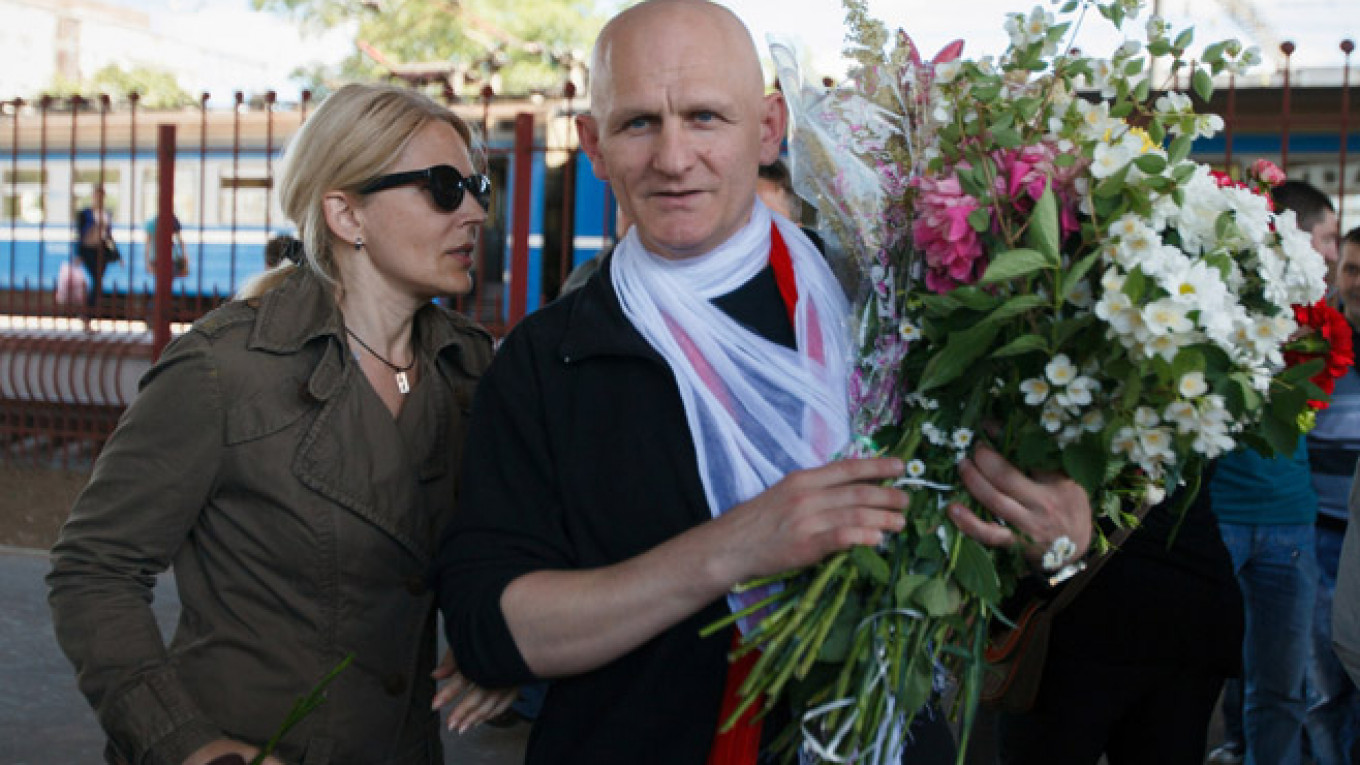A prominent Belarusian human rights activist was released from prison Saturday in a move seen as a gesture from the authoritarian leader of Belarus to improve relations with the West.
Ales Bialiatski, the 51-year-old leader of the Vyasna rights group, was released nearly three years into his prison sentence, 20 months ahead of schedule.
Bialiatski was nominated for the Nobel Peace Prize in 2012 and received an array of international awards while imprisoned, including the U.S. State Department's 2011 Human Rights Defenders Award. His group has provided legal assistance to thousands of Belarusians arrested or imprisoned for challenging President Alexander Lukashenko's undemocratic policies.
He was convicted of tax evasion and sentenced to 4 years in prison in November 2011. Western governments criticized the trial as politically vindictive.
Supporters greeted Bialiatski at a train station in the capital, Minsk, after he traveled from prison in the city of Bobruisk.
"The international support and the support back home, this is what brought about my release," Bialiatski told reporters. "I will continue to do what I've been doing."
Bialiatski said he was treated "badly and brutally" in prison, including regular periods of solitary confinement.
Rights advocates say six people remain in prison for political activism, including former presidential candidate Nikolai Statkevich.
Lukashenko and his associates were slapped with international sanctions in reply to their crackdown on opposition figures.
Analysts say Beliatski's release could reflect Lukashenko's wish to mend ties with the West at a time when Belarus is at odds with its longtime partner, Russia, over the conflict in Ukraine.
Lukashenko has been dismissive of the Moscow-backed idea of autonomy for Ukrainian regions and instead backs Ukrainian unity. Unlike Russian President Vladimir Putin, Lukashenko has maintained ties with Ukraine's new government and attended the inauguration of the new Ukrainian president.
"Lukashenko is giving a strong signal to the West that he is willing to improve relations," said Minsk-based political analyst Alexander Klaskovsky. "Lukashenko is showing that he does not want to be dependent on Russia."
U.S. State Department spokeswoman Jen Psaki welcomed Bialiatski's release, calling it "a positive development," but reiterated the call for Belarus to immediately release all political prisoners and restore their political rights.
"These actions would pave the way for normalization of relations between the United States and Belarus," she said in a statement. "We stand with the people of Belarus and reaffirm our readiness to help them build a democratic, prosperous, and truly independent European state."
See also:
A Message from The Moscow Times:
Dear readers,
We are facing unprecedented challenges. Russia's Prosecutor General's Office has designated The Moscow Times as an "undesirable" organization, criminalizing our work and putting our staff at risk of prosecution. This follows our earlier unjust labeling as a "foreign agent."
These actions are direct attempts to silence independent journalism in Russia. The authorities claim our work "discredits the decisions of the Russian leadership." We see things differently: we strive to provide accurate, unbiased reporting on Russia.
We, the journalists of The Moscow Times, refuse to be silenced. But to continue our work, we need your help.
Your support, no matter how small, makes a world of difference. If you can, please support us monthly starting from just $2. It's quick to set up, and every contribution makes a significant impact.
By supporting The Moscow Times, you're defending open, independent journalism in the face of repression. Thank you for standing with us.
Remind me later.






